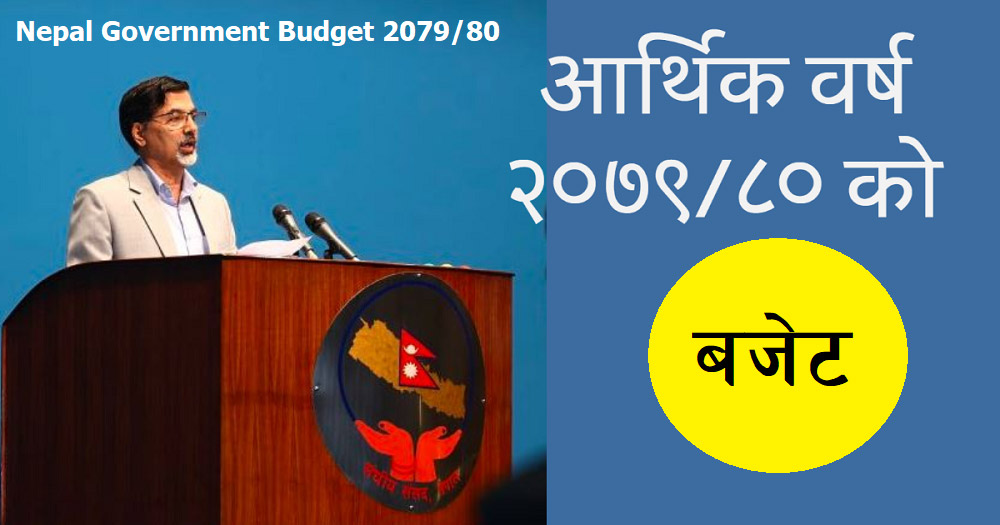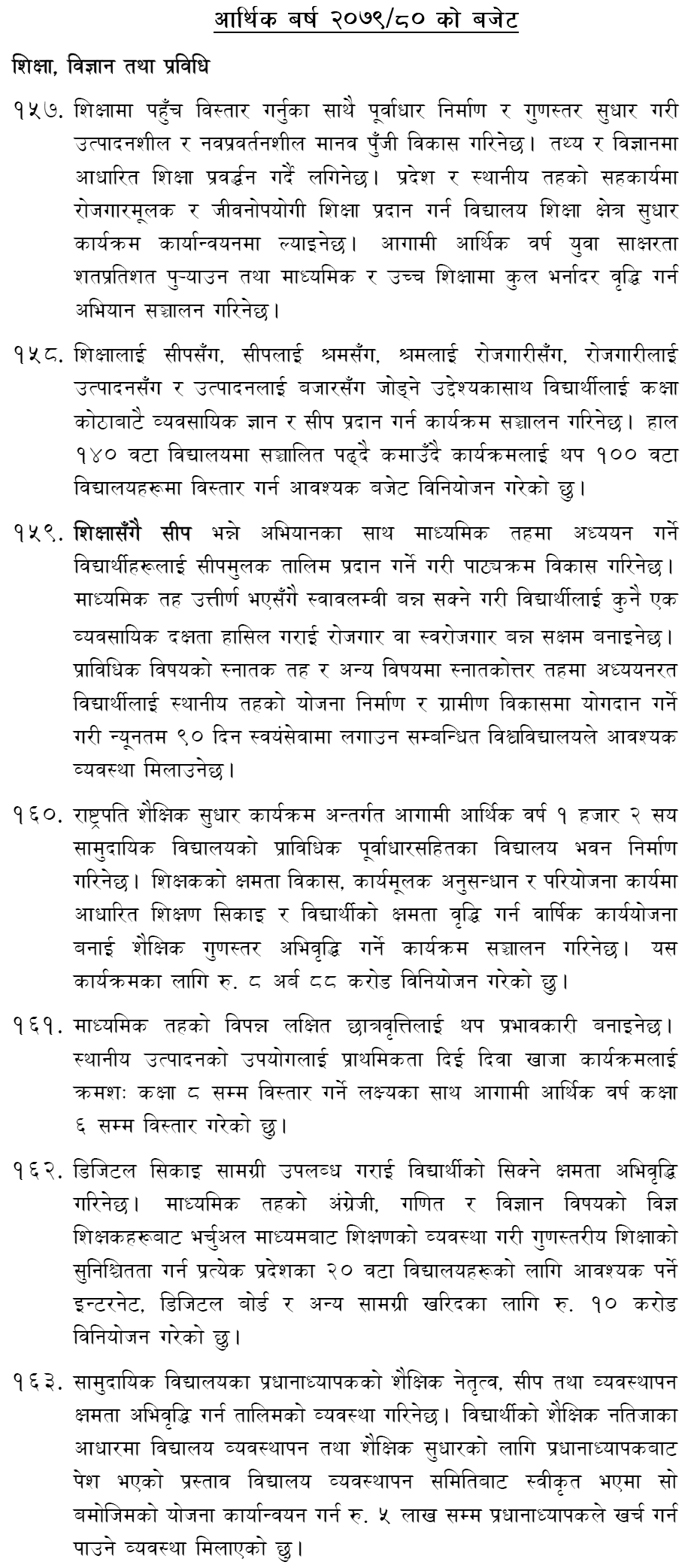
The government has allocated Rs. 70.05 billion to the Ministry of Education and Science and Technology. Announcing the budget for the fiscal year 079/80 on Sunday, Finance Minister Janardan Sharma informed that the amount has been allocated to the Ministry of Education and Science and Technology.
Similarly, the government is going to make arrangements for arranging higher education in the country on new and emerging issues. Similarly, a Center of Excellence will be set up at Tribhuvan University, said Minister Sharma.
Minister Sharma said that training has also been arranged for the headmasters to improve the quality and leadership of community schools.
Education, Science and Technology Budget for the Fiscal Year 2079/80:
- Access to education will be expanded and productive and innovative human capital will be developed by building infrastructure and improving quality. In facts and science
- Based education will be promoted. School education sector reform to provide employment-oriented and life-sustaining education in collaboration with the state and local levels
- The program will be implemented. In the forthcoming economic war, a campaign will be launched to increase youth literacy to 100 percent and to increase the total enrollment rate in secondary and higher education.
- With the objective of connecting education with skill, skill with labor, labor with employment, employment with production, and production with the market, programs will be conducted to impart business knowledge and skills to the students through the classroom. A necessary budget has been allocated to expand the program to 100 more schools, currently operating in 140 schools.
- Along with education, the curriculum will be developed to provide skill-based training to the students studying at the secondary level with the campaign called Skills.
- Students will be enabled to become self-employed or self-employed by acquiring one of the vocational skills so that they can become self-reliant after passing the secondary level.
- The university concerned will make necessary arrangements for the students studying at the undergraduate level in technical subjects and other disasters to volunteer for at least 90 days to contribute to the local level planning and rural development.
- Under the Presidential Educational Reform Program, school buildings with a technical infrastructure of 1,200 community schools will be constructed in the coming Fiscal Year. A program will be implemented to enhance the educational quality by making an annual action plan for teacher capacity development, functional research, and teaching and learning based on project work and increasing the capacity of students. For this program, Rs. 8 billion 300 million have been allocated.
- Poor targeted secondary level scholarships will be made more effective. Giving priority to the use of local products, the lunch program has been extended to class 6 in the coming fiscal year with the aim of gradually expanding to class 8.
- Students' learning ability will be enhanced by providing digital learning materials. In order to ensure quality education by arranging virtual medium education through expert teachers of secondary level English, Mathematics, and Science, I have allocated Rs. 100 million has been allocated.
- Arrangements will be made for training to enhance the educational leadership, skills, and management capacity of community school principals. If the proposal submitted by the headmaster for school management and educational reform on the basis of the student's academic results is approved by the school management committee, Rs. Provision has been made for the headmaster to spend up to Rs. 500,000.
- Arrangements will be made for regular interaction between the teacher management committee and the parents to awaken the sense of our school, and our responsibility. From this year, community schools will be categorized on the basis of performance indicators. Schools that meet certain criteria will be declared as model schools and rewarded. The grant program has been given to educational institutions including Gurukul, Gumwa, and Madrasa which have been conducting educational programs.
- An appropriate number of teachers, professors, and staff working in government schools, campuses, and community campuses will be maintained by reviewing the posts to ensure service security and career development. Arrangements will be made to fill the vacancies through a permanent process by determining the level of vacancies. Schools will be adjusted by mapping community schools in collaboration with the local level. Residential schools will be constructed as per the need. Programs will be implemented to increase the access to quality education for the children of deprived, Dalit, minority, endangered castes, backward areas, remote and mountainous areas, and economically deprived families, and children with special needs.
- The Martyrs' Memorial School was established for the families of martyrs and missing persons who sacrificed their lives during the transformational movement and war, and the children of the families injured and disabled in various movements will be gradually turned into public technical schools.
- Technical and Vocational Education Training Council will be restructured and developed as a separate training quality regulatory body and skill-based training program implementation body. Expansion of Technical and Vocational Education: Access will be expanded by mapping and adjusting the existing technical schools with the idea of ââbeing the basis of prosperity. Technical schools will be gradually transferred to the states. Towards technical and vocational education training Rs. 8 billion 300 million has been allocated.
- In order to reduce the tendency to go abroad for higher education by providing opportunities for the study of higher education in new and emerging subjects within the country, it will be facilitated to establish an international level information technology study academy in the concept of public-private partnership. Tribhuvan University will be developed as a Center of Excellence to make the teaching and learning of higher education based on research. Reservation arrangements will be made for foreign students in higher educational institutions of Nepal and easy arrangements will be made for admission, visa, and accommodation. Easy visa facility will also be provided to foreign professors to come to Nepal.
- In order to maintain the provincial balance by expanding quality health education and services, a policy will be adopted to establish medical colleges in the hospitals under the state government in collaboration with the universities. Arrangements will be made to run medical colleges under the respective universities in collaboration with Butwal Medical College and Lumbini Provincial Hospital, Surkhet Medical College and Karnali Provincial Hospital, Karnali Institute of Health Sciences and Chorjahari Community Hospital and Geta Medical College and Seti and Mahakali Hospital. The process of establishing a medical college in Dadeldhura will be taken forward.
- Considering the inadequacy of doctors and health workers in proportion to the population, necessary legal arrangements will be made regarding enrollment number, enrollment process, and institutional arrangements to facilitate the study in health education from certificate level to specialized higher education. Capacity will be developed for the educational institutions providing health education to enroll students twice a year. This will create a situation where Nepali students do not have to go abroad for medical education and will also save foreign currency. Facilitation will be provided to establish medical colleges in various places outside Kathmandu with necessary infrastructure to attract foreign students to medical education.
- A research and development coordination committee comprising executive heads of Tribhuvan University, Kathmandu University, Nepal Agricultural Research Council, and Nepal Academy of Science and Technology will be formed to make research programs more effective by coordinating and cooperating with research and investigation bodies on various issues. Young scientists will be encouraged in research. For research, cooperation and partnership will be made with the National Innovation Center and other innovation centers. Necessary funds have been allocated for the research to be done through the research centers of Tribhuvan University including SEDA, Serid, Sinas, Recast, and other research centers of the university.
- A structure with a multi-purpose planetarium park will be constructed in collaboration with Kathmandu Metropolitan City by integrating government and public lands for knowledge and entertainment related to astronomy.
- For the Ministry of Education, Science and Technology, Rs. 70.04 billion has been allocated. In the education sector, Rs. 5 billion 320 million and Rs. 121.10 billion has been transferred.







